Both leaders spoke separately at events in Abuja on Monday, urging sub-national governments to translate higher statutory allocations into tangible development, improved livelihoods, and job creation.
Speaking at the public presentation of “Vicious Red Circle,” a book on human trafficking authored by Alex Oriaku, Prof. Yilwatda said Nigerians must begin to demand people-oriented projects from their state and local governments, given the huge fiscal inflows now accruing to them.
Yilwatda said, “No governor in Nigeria collects less than three times, up to four times what they used to collect before — none. Who knows that two years ago, there was a sharing of about N400bn per month—but today, the last sharing they did was N2.2tn.
“So, they can do more for their people. No governor collects less than three times— none. They are focusing now on bigger projects. And to me, this is a turnaround that we need in governors. I would say, talk to your governors. Talk to your local government chairmen. Let them do more.”
Yilwatda, who assumed leadership of the APC amid mounting criticism of government economic policies, maintained that the administration of President Bola Tinubu was on the right track.
He expressed optimism that the party would drive the country towards economic recovery.
On his part, Akpabio, while speaking at the joint graduation ceremony of the National Institute for Legislative and Democratic Studies (NILDS) and the University of Benin, also urged State Houses of Assembly to hold governors accountable for how they deploy the increased allocations.
Akpabio said the National Assembly’s enhanced oversight and legal reforms had significantly boosted revenue inflows to the Consolidated Revenue Fund.
This, according to him, in turn leads to higher allocations for both federal and state governments.
He said, “We have no other country to call our own and so, we must invest for the overall good of our country. As members of the 10th Senate, we will continue to do our part to strengthen existing legal frameworks and enhance our oversight responsibilities of public institutions to ensure that they deliver effective public service.
“Our efforts in this direction have contributed tremendously to increasing the revenue that accrues to the Consolidated Revenue Fund, hence, it has translated to higher revenue allocation to states and the federal government.
“Therefore, as the 10th National Assembly is using its instrument of oversight to ensure that the Federal Government delivers effectively on public services, I also call on state legislatures to ensure that the increased revenue to their governors and states translates to improved livelihood and job creation for citizens.”
Also speaking at the event, the Speaker of the House of Representatives, Tajudeen Abbas, reaffirmed the National Assembly’s commitment to reforming Nigeria’s budget process to ensure fiscal discipline and accountability.
“The reforms of President Bola Tinubu’s administration are yielding results. Though we may have different experiences to tell, what is clear is that our economy is on a better growth trajectory today than it would have been under a business-as-usual scenario,” Abbas said.
He noted that inflation had declined below 20 per cent and the naira was appreciating against major global currencies, adding:
“Though it is not yet uhuru, the country is racing closer to a single-digit inflation rate and healthier exchange rate position.
“Just as the President has led the way with the Fiscal Policy and Tax Reforms, the 10th House of Representatives is also committed to reforming the budget process to ensure commitment to budget timelines as it applies to budget preparation, enactment, implementation, and oversight.”
On his part, the Director-General of NILDS, Prof. Abubakar Sulaiman, called on both federal and state governments to increase funding for tertiary education in the 2026 budget, warning that low investment could further weaken human capital development.
“The funding of higher institutions has a direct relationship with human capacity development.
“Invariably, low funding would translate to poor quality graduates,” he said, urging authorities to find a lasting solution to the incessant ASUU strikes disrupting the university system.
Meanwhile, at the book presentation, discussions also touched on the menace of human trafficking, with the Director-General of the National Intelligence Agency, Mohammed Mohammed, describing it as one of the world’s most dangerous transnational crimes, comparable to drug and arms trafficking.
“Human trafficking has eroded our social fabric and robbed some of our people of their dignity and future,” he said, stressing that the NIA continues to support the National Agency for the Prohibition of Trafficking in Persons with intelligence and operational backing.
Reviewer of the 198-page book, Dr. Ike Neliaku, President of the Nigerian Institute of Public Relations, examined the link between corruption, manipulation, and exploitation, urging Nigerians to reject the “culture of silence” that sustains such evils.
In his remarks, author Alex Oriaku said “Vicious Red Circle” seeks to expose the cycle of exploitation and silence fueling human trafficking. “It’s a circle that preys on the desperate, the vulnerable, and the unseen,” he said.
punch.ng
FOLLOW US ON:






































